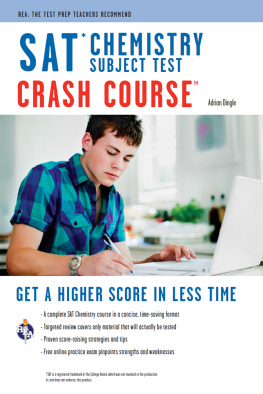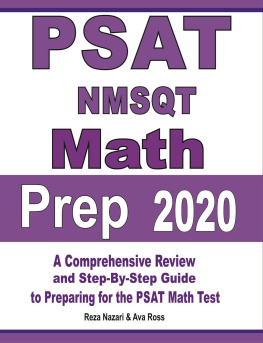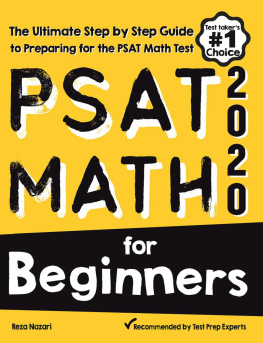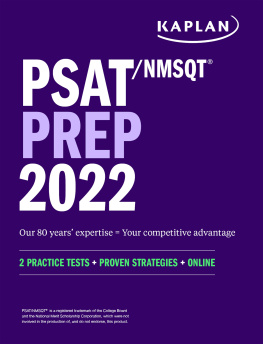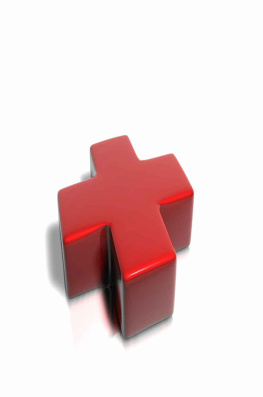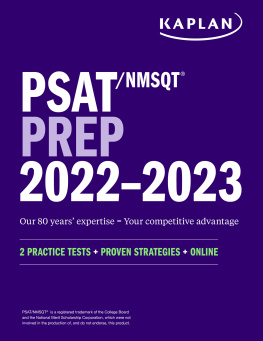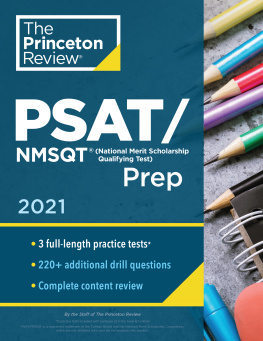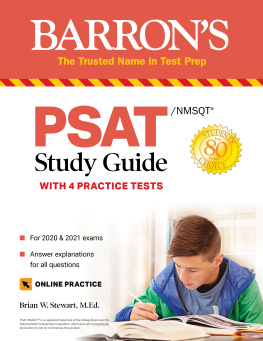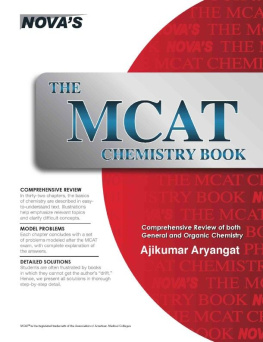REA: THE TEST PREP TEACHERS RECOMMEND
| SAT * | CHEMISTRY
SUBJECT TEST |
CRASH COURSE

By Adrian Dingle
The Westminster Schools
Atlanta, Georgia
 | Research & Education Association
Visit our website at: www.rea.com |
Research & Education Association
61 Ethel Road West
Piscataway, New Jersey 08854
E-mail: info@rea.com
SAT CHEMISTRY SUBJECT TEST
CRASH COURSE
Copyright 2013 by Research & Education Association, Inc.
All rights reserved. No part of this book may be reproduced in any form without permission of the publisher.
Printed in the United States of America
Library of Congress Control Number 2012932837
eISBN-13: 978-0-7386-7125-3
LIMIT OF LIABILITY/DISCLAIMER OF WARRANTY: Publication of this work is for the purpose of test preparation and related use and subjects as set forth herein. While every effort has been made to achieve a work of high quality, neither Research & Education Association, Inc., nor the authors and other contributors of this work guarantee the accuracy or completeness of or assume any liability in connection with the information and opinions contained herein and in REAs software and/or online materials. REA and the authors and other contributors shall in no event be liable for any personal injury, property or other damages of any nature whatsoever, whether special, indirect, consequential or compensatory, directly or indirectly resulting from the publication, use or reliance upon this work.
Cover image Robert Daly/OJO Images/Getty Images
All trademarks cited in this publication are the property of their respective owners.
 | Crash Course and REA are trademarks of
Research & Education Association, Inc. |
SAT* CHEMISTRY
SUBJECT TEST
CRASH COURSE

Access your Online Exam
by following the instructions
found at the back of this book.
SAT CHEMISTRY SUBJECT TEST
CRASH COURSE
TABLE OF CONTENTS
ABOUT THIS BOOK
REAs SAT Chemistry Subject Test Crash Course is the first book of its kind for the last-minute studier or any student who wants a quick refresher on the subject. The book will provide you with an accurate and complete representation of the SAT Chemistry Subject Test.
Written by an expert whose professional focus over the last 22 years has been preparing students for standardized tests, our easy-to-read format gives students a crash course in chemistry. The targeted review chapters prepare students for the exam by focusing on the important topics that will mostly likely be addressed on the SAT Chemistry Subject Test.
Unlike other test preps, REAs SAT Chemistry Crash Course gives you a review specifically focused on what you really need to study in order to ace the exam. The review chapters offer you a concise way to learn all the important facts, terms, and key topics before the exam.
The introduction discusses the keys to your success on the SAT Subject Test in Chemistry and shows you strategies to help build your overall score. Also included is an introduction to the three different types of questionsclassification, relationship analysis, and five-choice completionyou will encounter on the SAT Chemistry Subject Test.
The remaining parts of the text make up our review chapters. Each chapter presents the essential information you need to know about chemistry. Interspersed throughout the review chapters are Test Tips written to help you attain the highest score on the SAT Chemistry Subject Test.
To check your test readiness for the SAT Chemistry exam, either before or after studying this Crash Course, take our FREE online practice exam. To access your free practice exam, visit www.rea.com/ studycenter and follow the on-screen instructions. This true-to-format test features automatic scoring, and detailed explanations of all answers, which will help you identify your strengths and weaknesses so youll be ready on exam day!
No matter how or when you prepare for the SAT Chemistry Subject Test, REAs Crash Course will show you how to study efficiently and strategically, so you can boost your score.
Good luck on your SAT Chemistry Subject Test!
ABOUT OUR AUTHOR
Adrian Dingle is a chemistry educator and author, with a total of 22 years of experience teaching in the United States and the United Kingdom. He is the creator of the award-winning chemistry website, www.adriandingleschemistrypages.com.
The focus of his teaching career has been on preparing students for standardized tests, AP and SAT subject tests in the United States, with an emphasis on A2/AS levels in the United Kingdom, and International Baccalaureate in both countries. An Englishman, he lives in Atlanta, Georgia, where he teaches at The Westminster Schools. He holds a B.Sc. (Hons.) Chemistry, and a Postgraduate Certificate in Education, both from the University of Exeter in England.
His other books include The Periodic Table: Elements With Style and How To Make A Universe With 92 Ingredients, the School Library Association of the UKs Information Book Award winner for 2011, and the winner, in 2012, of the prestigious literary prize Wissenschaftsbuch des Jahre, which is sponsored by the Austrian Ministry of Science and Research.
ACKNOWLEDGMENTS
In addition to our author, we would like to thank Larry B. Kling, Vice President, Editorial, for his overall guidance, which brought this publication to completion; Pam Weston, Publisher, for setting the quality standards for production integrity and managing the publication to completion; Alice Leonard, Senior Editor, for editorial project management; and Diane Goldschmidt, Managing Editor, for preflight editorial review.
We also extend our special thanks to S4Carlisle Publishing Services for content development and typesetting this edition.
PART I:
INTRODUCTION
Chapter
KEYS TO SUCCESS ON THE SAT CHEMISTRY SUBJECT TEST
BACKGROUND
The SAT Chemistry Subject Test assesses the knowledge and understanding that one might reasonably expect to have gained after successfully completing a one-year, college preparatory chemistry course in high school.
It is assumed that a laboratory component will have been included in the course because some of the questions on the test will examine knowledge and understanding of the equipment and techniques employed in typical high school chemistry lab situations.
Rudimentary mathematical skills associated with the metric system, algebra, ratios, direct and inverse proportions, the use of exponents, and scientific notation is also part of the students anticipated knowledge base.
Chemistry-related skills that are anticipated include recall, application, and synthesis of knowledge in approximately 20%, 45%, and 35% of the test, respectively.
LOGISTICS
Next page
